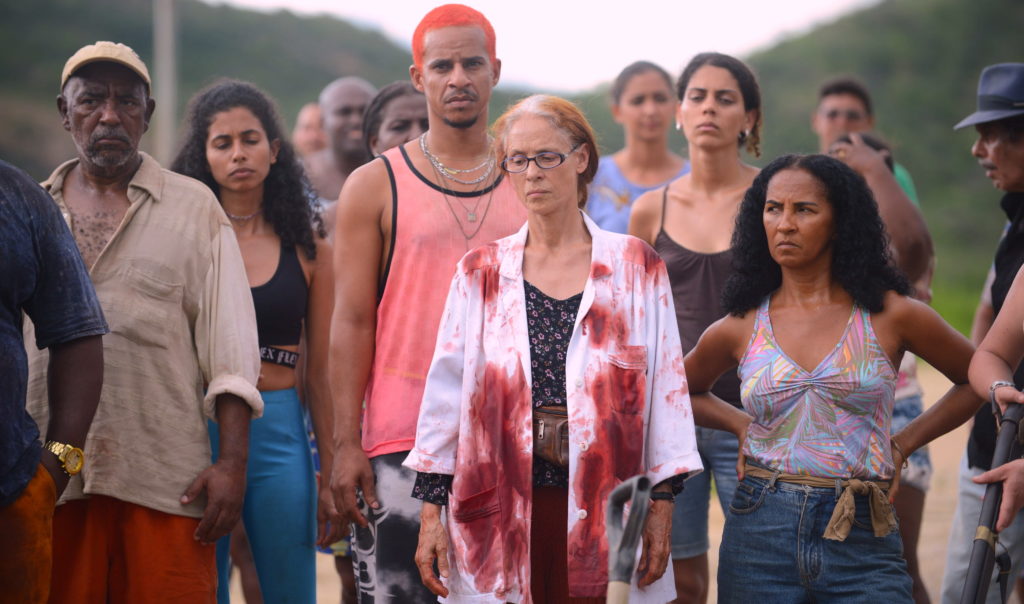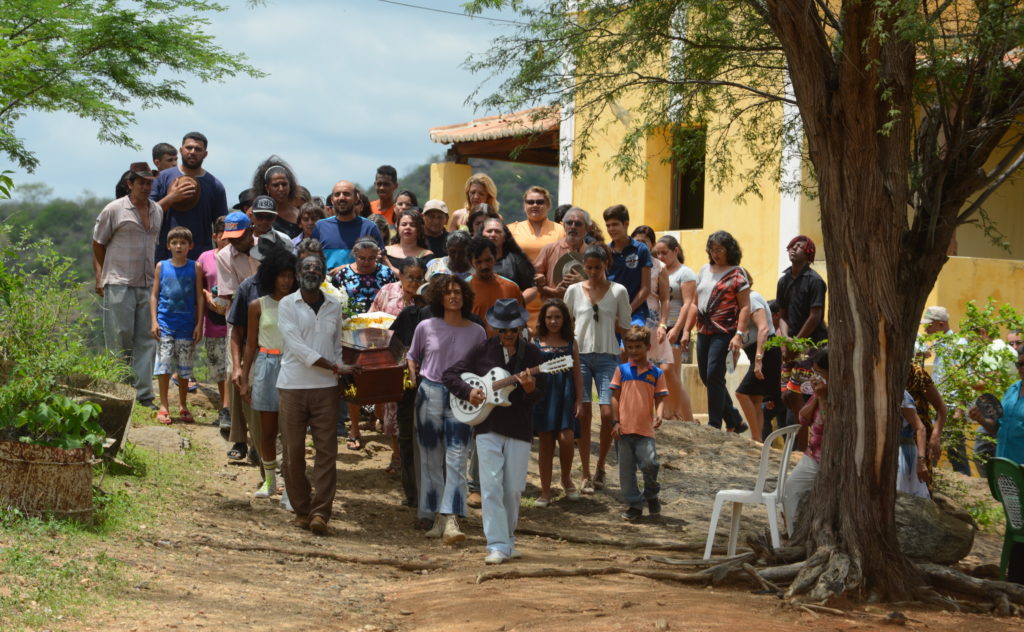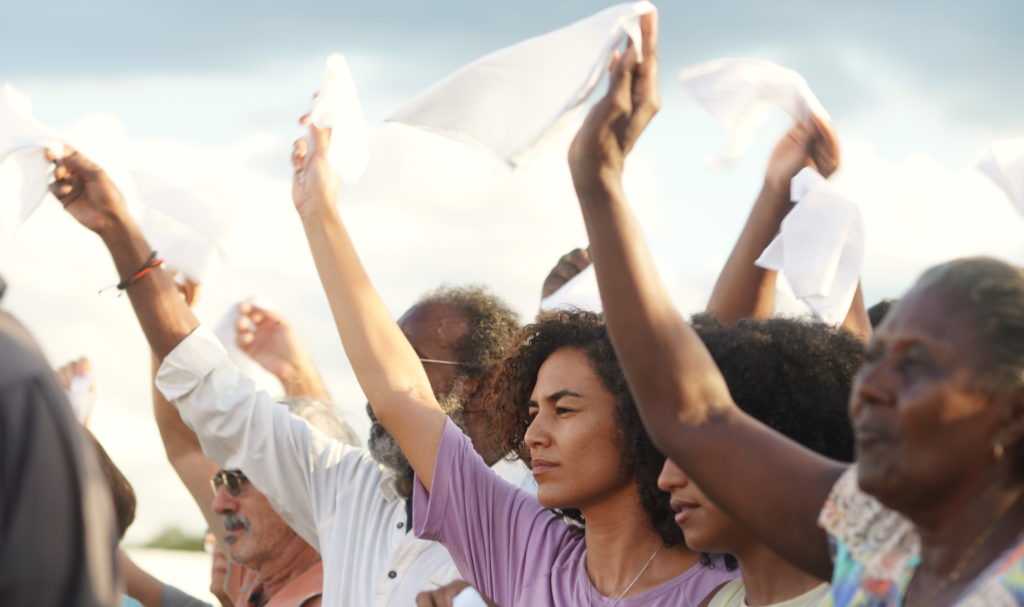Bacurau (translated from the Portuguese as “nighthawk”) is a fictional village in northeastern Brazil and the setting of the latest film from Kleber Mendonça Filho (Aquarius, Neighboring Sounds) and his production designer turned co-director, Juliano Dornelles. Bacurau the movie is a little harder to explain: It’s the craziest western Sergio Leone never made, a homage to The Most Dangerous Game, and a tender portrait of a very quirky, isolated community, laced with an angry political message.
The first 40 minutes are deceptively quaint. A woman named Teresa (Bárbara Colen) returns to Bacurau for the funeral of her elderly grandmother, an event that brings out the whole town and is loudly disrupted by a drunken dissenter who happens to be the town doctor (veteran Brazilian star Sonia Braga). A visit from a corrupt local politician reveals that the town is dependent on outside sources for clean water and is being ruthlessly underserved and exploited. Gradually, more ominous signs appear: Cell phone service dies; a truck carrying water arrives riddled with bullet holes; a weird flying saucer drone looms overhead; two garishly dressed motorcyclists enter the town. Those strangers, it’s soon revealed, are affiliated with a group of American tourists who’ve paid big money to hunt down the residents of Bacarau. Let the vicious games begin!
Winner of the Jury Prize at the 2019 Cannes Film Festival (an award shared with France’s Les Misérables), Bacurau opens on March 6 via Kino Lorber. Mendonça Filho’s previous films have earned international acclaim, but his latest—already a big hit in Brazil—seems poised to find a much broader audience. “Probably because it has a strange mix of different elements,” Mendonça Filho speculated during his visit to Manhattan for the New York Film Festival in October. “Sometimes it’s an action film, and then it gets quite violent, and then it’s quite compassionate. It’s a little bit funny here and there, and it’s a very honest portrayal of a small community in a faraway place. But it’s also universal in a strange way.”
One quality Bacurau shares with Mendonça Filho’s more understated earlier films is a simmering aura of menace. “It’s a wonderful device in any decent dramatic narrative,” he says. “You know, when things don’t go so well, you get worried and that generates tension, and then you want to see how the story will develop. But now, because it’s a genre film, everything is more spelled out and spectacular. In Neighboring Sounds [2012], the tension was there, but you couldn’t put your finger on it. Most of the time, nothing really happened. Aquarius [2016] is a little more explicit in its intentions. And this one is like an all-out classic western setup, which also came from my and Juliano’s love for the best American films of the ’70s. I was very young in the ’70s and I was a teenager in the ’80s. Juliano is 11 years younger than I am, so he had a different experience with VHS and DVDs. But Michael Cimino, [Sam] Peckinpah, [John] Carpenter, John McTiernan—very good classic American directors, very American in a very interesting way for us to observe American cinema. [Other influences were] Leone and Corbucci from the Italian side, and of course Brazilian cinema from the ’60s, which is one of our best vintage periods.”
Reporting from Cannes, New York Times critic Manohla Dargis compared Bacurau’s “heart-thumping political allegory” to the work of provocative horror director John Carpenter. Mendonça Filho is a fan, and he even uses Carpenter’s music composition “Night” in Bacurau. “When I think about Carpenter, I think more about his amazing visual style, his Panavision shots, and his sense of rhythm and menace. And, of course, I also think about some of the political commentary he has made: They Live and Prince of Darkness. But I really think about his style and his sense of menace and space. He’s part of my life. In December 1981 I was 13, and I went to see with my mom Raiders of the Lost Ark, an unforgettable cinemagoing experience. But that film did not make me want to make films, because it felt so spectacular: ‘This is impossible. I live in Recife, Brazil. I’m 13, and this is not gonna happen.’ But two years later, I took home on VHS three films by John Carpenter: Escape from New York, Assault on Precinct 13, and Halloween. When I saw Assault on Precinct 13, I said, I think I can make a film—because it’s very simple, very strong, very good, very American in the classic sense. So this was inspiring. And I’ve been in that mode since 1983. Halloween is a similar example. A couple of houses, streets, a lot of darkness and shadows. A strange, scary mask, which I think you could buy for a dollar. You don’t have to spend a lot of money.”

Mendonça Filho continues, “Neighboring Sounds and Aquarius are very straight dramas about people living life—kitchen-sink dramas, like the British used to say. But I would shoot a scene in a kitchen, and in my mind it would be a scene John Carpenter could probably shoot if he made a kitchen-sink drama. I wouldn’t shoot it like Ken Loach with a handheld camera. For me, I was already making Bacurau, but Bacarau is so much more because we have horses and landscape vistas and people with guns and it becomes a much clearer exercise in genre. Aquarius leaned a little bit towards the thriller, but it never really admitted that it was a thriller.”
At the same time, Bacurau is steeped in authenticity: The gritty location and the weathered actors (many of them nonprofessional) give the film a near-documentary quality. “We got very lucky,” says co-director Dornelles, “because we discovered a place, and places nearby, where there were people with wonderful faces and personalities. We made this film together, and they understood very well the kind of film they were doing and the story—it’s almost like they had already experienced some of the emotions. You can feel it in the film.”
Dornelles explains that the area where they filmed “is very isolated and they suffer a little bit of prejudice from the bigger city. It’s a district of a bigger city of 20,000 inhabitants, and only about 80 people live there. They kept asking us, why do we want to make a film there? There’s nothing there. They didn’t understand. And now everybody’s so proud of the film.”
“When we were traveling to find the location, to discover the place,” Dornelles continues, “we had some beautiful confirmations that we were on the right path in terms of the script. For example, an 80-year-old lady invited me to visit the museum of the community. And of course I said yes, because I’m very smart. When I entered her house, she pointed to one of the walls of the living room and said, ‘This is the museum.’ A lot of photographs, objects hanging, and newspaper clippings. Very dignified. It was a museum, very small-scale but legit. [A similar town museum plays a key role in the film.] That was wonderful to experience. It makes me feel like Bacurau really exists. Good things can happen in places like that.”
Dornelles calls Bacurau “a micro-representation of Brazil. We have many different ethnicities. It was very important to us, because it’s a film about the community. There are no leading roles, there are many important characters. So if they are very different from each other, it’s more interesting.”

Dornelles’s “promotion” from production designer to co-director occurred “in a very natural way,” he says, “because we have been friends for 16 years and we had the idea together in 2009. We never discussed how we were going to do it; we just started to talk about the idea. We started to look for funding and then it happened. … We spent eight months writing the final draft of the script. We just make everything together, since the beginning. We are still friends and we still love each other.
“I’ve always worked with friends as a production designer. I have my own projects as a screenwriter and director. It’s a group of friends that love cinema. I’ve always loved Kleber’s films and ideas, and he keeps inviting me and I keep accepting.”
Mendonça Filho is currently embroiled in a fight with the right-wing Brazilian government of President Jair Bolsonaro, which is demanding he return the money it gave him to finance Neighboring Sounds, claiming the production exceeded the maximum budget qualifying it for the funds. “One thing that makes me sleep at night is the understanding that I’m not the first, and I won’t be the last artist to be attacked by people in government,” the director says. “I have this ideological disagreement with them, and it has happened many times before. It’s such a bizarre, unprecedented manipulation of fact and fiction to put together some crazy accusation, that we are absolutely sure it’s gonna go away. We’re working with lawyers and everything, but it has never happened before—a film being made and delivered, being successful. And then years later, after everything has been filed and approved, at exactly the time when Brazil begins to leave the democratic road, new people from the extreme right get to the minister of culture and they go back to folders which have long been put away in filing cabinets. They come up with a crazy, nonsensical demand to give back all the money for a film that cost $450,000 and has represented Brazilian cinema internationally. It’s very much a portrait of what’s going on in the country now. And, in fact, the same minister of culture was actually scrapped. He was prepared for the scrapyard by the same people who accuse me. On January 1st [of 2019], the ministry of culture was extinguished after 40 years of incredible services to Brazilian culture and cinema, theater, literature, music. It’s a scandal. It’s a complete lack of understanding of the importance of culture, a complete lack of respect for artists. It’s just a sinister moment for the country.”

The two directors also believe strongly in the importance of the big-screen experience. “This film was made to be seen in cinemas with a wide screen,” Dornelles asserts, “with Panavision anamorphic lenses, with people applauding and shouting.”
“I would be thrilled if this film makes its way to streaming after it has gone through the old-fashioned, exciting filmgoing experience that I cherish so much as a cinephile,” Mendonça Filho says. “I’m 50 now, so I can say that. Julian is 39 and he sticks with me. We shot it for the wide screen. We’ve been incredibly lucky, because since May we have screened Bacurau in probably the best large-scale classic cinemas in the world. The State Theatre in Sydney, the Lumière in Cannes, Alice Tully Hall in New York City, the Luxor in Paris. And the São Luiz theater [in Recife, Brazil], a thousand-seat, 1952 movie palace, which is the top-grossing cinema in the country for Bacurau. It’s like a church. Baroque. It’s incredible, a jewel. So every time it plays in some place like that, something happens with Bacurau. It establishes an atmosphere and people just get really excited with the film, and there is applause in the middle.”
“We’re also going to show it at the Odeon Leicester Square in London, which is one of the best cinemas in the world. I grew up in England, and I used to go to Leicester Square with my family. There was the Empire, probably the best cinema on the planet, and then the Odeon, which wasn’t very far, and the Warner West End. So it’s such a privilege, such an honor.
“We are very old-fashioned. I think the film should come out on Blu-ray, it should be seen on Netflix, it should be seen on digital platforms, but it’s essential that it has the best, longest, most amazing life on the big screen.”
“I don’t like the idea of someone seeing this film on a telephone,” Dornelles interjects.
“We can’t really help it. It’s going to happen.”
“I don’t want to think about this.”
“But it’s gonna happen, and it’s fine,” Mendonça Filho responds, “My point is we should protect the film in terms of getting adequate windows for each of its lives. … What we are doing with Bacurau in Brazil, where we have complete control, is being draconian in terms of not letting the film leak. No links go out, no DCPs, nothing. We say, no, no, no, no. We only show the film on a proper DCP. We are on the sixth week, and it has just opened in France and it hasn’t shown up on the internet. I hope it stays that way until maybe December. It’s very important because people are going to the theater and it has been quite an experience. We also sent a little letter—it’s been done before, Lynch did it with Lost Highway—asking the projectionist very nicely: Please, play it a little stronger. Just turn it up a little bit. It’s good for your business, because there is a difference.”
In closing, Mendonça Filho mentions an ally in the fight for the big screen. “None of the big chains in Brazil wanted Roma when they offered it. One of our most enthusiastic exhibitors owns 19 screens, and Bacurau is bringing in a lot of money for him. He’s a very nice guy, and last year Netflix wanted to pay him something like $100,000 to stage three big high-profile screenings of Roma. And he said, with all due respect, fuck you, because I get paid now, and then I will lose in the future with you committing violence against the act of going to the cinema.”



Share this post